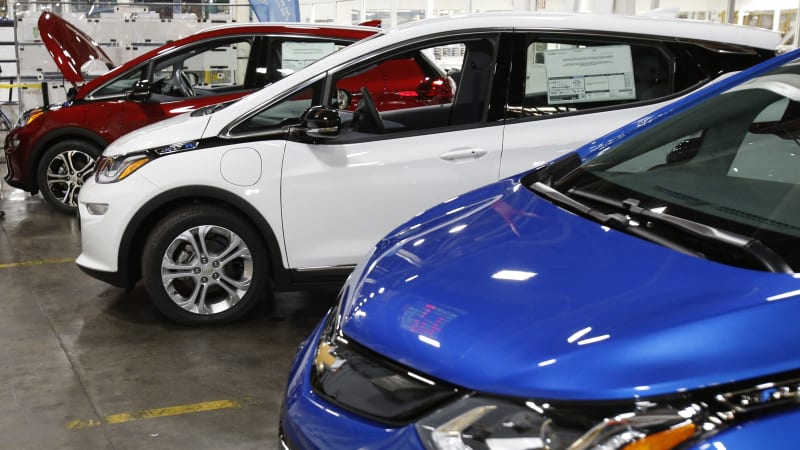Federal spending deal does not extend the EV tax credit
https://ift.tt/2YST9wm

WASHINGTON — The U.S. Congress has declined to extend a $7,500 tax credit for electric vehicles.
General Motors and Tesla have been pushing for more than a year for extension of the credit, which phases out once an automaker hits 200,000 vehicles sold, and many lawmakers had been pushing to include the extension. The tax credit is aimed at defraying the cost of electric vehicles that are more expensive than similarly sized internal combustion engine vehicles.
Both GM and Tesla have already hit 200,000 EV sales. Sen. Debbie Stabenow, a Michigan Democrat who authored a proposal to extend the credit, said Monday the EV proposal faced significant opposition from the White House, according to her office.
Tesla’s credit fell to $1,875 in July and will be zero after Dec. 31. GM’s credit fell to $1,875 on Oct. 1 will be zero after March 31.
Stabenow proposed in April granting each automaker a $7,000 tax credit for an additional 400,000 vehicles on top of the existing 200,000 vehicles eligible for $7,500 tax credits. A separate bill in the U.S. House proposed a smaller credit for used EVs.
Republican and Democratic lawmakers hope to pass the $1.4 trillion spending bill before current government funding runs out on Saturday, to avoid a partial government shutdown and head off the kind of messy budget battle that resulted in a record 35-day interruption of government services late last year and early this year.
Other areas addressed in the bipartisan deal :
Aviation safety
In response to two Boeing crashes that killed 346 people and led to the grounding of the 737 MAX fleet, Congress will increase funding for aviation safety by $67 million, which is “targeted for hiring specialized staff with expertise in human factors; and increases training and credentialing requirements for safety inspectors.”
It also boosts funding to “improve the safety reporting database … and to promote U.S. safety standards with foreign civil aviation authorities through outreach and training.”
The Federal Aviation Administration’s certification of the MAX and its long-standing practice of delegating some tasks to Boeing has come under harsh criticism from lawmakers.
A report released in October said the FAA had just 45 people in an office overseeing Boeing’s Organization Designation Authority and its 1,500 employees.
The FAA’s office overseeing Boeing has just 24 engineers, some with limited experience, and they face a wide range of tasks to ensure compliance in overseeing Boeing’s 737, 747, 767, 777 and 787 programs.
Gun safety research
The budget deal would for the first time in two decades provide money for federal research on gun safety. A law adopted in the 1990s has effectively blocked such research and prohibits federal agencies from engaging in advocacy on gun-related issues.
The spending bill, set for a House vote as soon as Tuesday, would provide $25 million for gun violence research, divided evenly between the National Institutes of Health and the Centers for Disease Control and Prevention.
If approved by the House and Senate and signed by President Donald Trump, the proposed funding would be a major legislative victory for Democrats, gun control supporters and researchers who have pushed in recent years to study gun violence in the same way scientists look at opioid overdoses and other public health crises.
“Nearly seven years to the day after we lost 20 beautiful children and six adults at Sandy Hook Elementary” in Newtown, Connecticut, “we are finally making progress in Congress to reduce gun violence,” said Rep. Rosa DeLauro, D-Conn., chairwoman of the labor and health subcommittee of the House Appropriations panel.
The new funding for NIH and CDC “will help us better understand the correlation between domestic violence and gun violence, how Americans can more safely store guns and how we can intervene to reduce suicide by firearms,” DeLauro said.
Other
— $746 billion for defense accounts, including $631 billion in core Pentagon funding, $80 billion for overseas military operations, and $36 billion for military bases and Energy Department nuclear activities.
— $655 billion for domestic Cabinet department and foreign aid accounts.
— A repeal of several Obamacare taxes on high-cost “Cadillac” health plans, medical devices and health insurance plans.
— Raising the age for purchasing cigarettes and other tobacco products from 18 to 21.
— Funding to pay full health and retirement benefits to about 100,000 retired union coal miners whose benefits would otherwise be at risk because of coal industry bankruptcies.
— A seven-year reauthorization of the Export-Import Bank, which helps finance purchases from U.S. manufacturers.
— A seven-year reauthorization of a government backstop for terrorism risk insurance on major construction projects.
— A two-year extension of federal financial help for schools in rural counties.
— An extension of increased Medicaid funding for hurricane-devastated Puerto Rico and other U.S. territories.
— An extension through Sept. 30 of the federal flood insurance program.
— A renewal of visa programs for foreign seasonal and skilled workers.
— The legislation, worked out during weeks of negotiations between leading lawmakers and the Trump administration, denies President Donald Trump the full $5 billion he requested to help build his signature wall along the U.S.-Mexico border, keeping funding static at $1.37 billion for border barriers.
Auto Blog
via Autoblog https://ift.tt/1afPJWx
December 16, 2019 at 07:02PM
